- Home
- Linwood Barclay
Bad Move zw-1 Page 10
Bad Move zw-1 Read online
Page 10
Earl put up his hands, cigarette smoke trailing from his right one, like he was under arrest. “Never.” Slowly, he lowered his hands.
“Let me tell you a story,” he said. “A guy used to be a cigarette smuggler, took cartons by boat from the U.S., across Lake Ontario, when Ottawa was taxing the shit out of tobacco. He’d bring them to the Indian reserve, up near the Thousand Islands. I’d pick up a carton from him now and then, what he didn’t turn over to the Indians. Anyway, he made a lot of money this way, and it was illegal, no question about it, the customs people wanted him, the cops wanted him. So one night, he’s going across with a couple of other guys, and suddenly there’s this other boat, you know? With the searchlight, and someone on a megaphone telling them to stop? The other guys, they throttle up, figure if they can get back past the midpoint of the lake, they can’t touch them, right? And the customs boat comes up alongside, and this guy’s buddies, they ram the boat, and one of the feds, he goes right off the bow, into the drink, but he’s not splashing around, like maybe he hit his head or something? And my friend, he sees this guy, looking like maybe he’s going to go under, and he dives in. His buddies on the boat, they think he’s fucking lost his mind, this is their chance to get away, while the other customs guys try to find him, but my friend, he can’t do that. He figures there’s no time to waste, and he gets this guy, grabs hold of him, screams for the feds so they’ll get a light on him and pull them both in.”
I didn’t say anything.
“So, anyway, my friend got charged, of course. But he saved that asshole’s life. All I’m saying is, there’s good in everybody.”
I stood up to leave. “I hear you, Earl. Thanks for the beer.”
I went back across the street, passing Trixie’s driveway, where a low-slung blue BMW was parked next to her Acura. I unlocked my front door and went inside, flipping the deadbolt behind me. I went into the kitchen and reached into the fridge for another beer.
The phone rang. I nearly jumped out of my skin.
“What’s new?” Sarah asked. I could hear her typing in the background, sending memos or editing stories while she chatted.
“Oh,” I said, “not too much.”
Except that the police dropped by, confirmed that the man I found in the creek definitely was murdered, so there’s a killer roaming around the neighborhood, and Earl, our neighbor across the street, has a gun in case his Asian employers start shooting it up with the Russian mob in a turf war over the massive pot-growing operation he has in his basement. Other than that, things were pretty quiet.
“Okay,” said Sarah. “I just thought I’d say hi. That was fun, what we did last night.”
“Huh?”
“Oh great. You’ve forgotten. I got the kids out of the house? With pizza money? Remember?”
“Oh, yeah, of course. Yeah, that was good.”
“I’m so glad I made an impression.”
“No, sorry. You did. Really. We should do that again soon.”
“You sure you’re okay? You sound kind of funny.”
“No, really, I’m fine. Just working.”
“Whoa,” said Sarah. “Meeting time. Gotta go. See ya tonight.” And she hung up.
Even though I was out of Earl’s humid house, I was still sweating. I should have told Sarah about him. I hadn’t promised Earl I wouldn’t tell her. But what if Sarah wanted to call the police? What then? I’d only promised Earl I wouldn’t call the police. I didn’t promise that I’d keep Sarah from calling the police.
Maybe that was my out. Tell her, let her do the dirty work, get me off the hook.
Right. Earl would understand. Earl, our neighbor who packs heat, would understand.
And then again, was it really that big a deal? Weren’t the pot laws twenty years behind the times? The place wasn’t a crackhouse, for cryin’ out loud. So a guy has a few plants in his basement. Okay, so maybe it wasn’t a few. So maybe Earl had a fucking farm where most people have a pool table. But was it any of my business?
And there were risks in telling Sarah, or the kids, what I knew. Risks to my reputation and integrity. The first thing they’d do is remind me whose idea it was to move out here in the first place: “Way to go, Dad. Thanks for rescuing us from the evils of the city.”
I went into my study and tried to work, but couldn’t focus. I kept getting up, going to the living room window, looking through the blinds to Earl’s place. At any moment, I expected to see a fleet of Ladas with Russian mobsters pull into the driveway, guns a-blazin’. Or maybe the cops, driving up on the lawn, pouring out of their cars in riot gear, guns drawn, surrounding the house. Tear gas is lobbed in. Men in gas masks break down the door, and moments later, Earl is dragged out by an officer on either side of him, thrown facedown onto the driveway, his hands cuffed together behind his back. Men in spacesuits start hauling out hundreds of plants and packing them into the back of a specially sealed van.
But nothing like that happened. The housecoat lady watered her driveway. The BMW, driven by a man in khakis and a sports jacket, his eyes shielded by sunglasses, backed out of Trixie’s driveway. A kid, a rare sight in the day in this neighborhood, actually rode by on a bicycle. Earl came out, got in his pickup, and drove off.
And I stood in the window, peering through the blinds, spying on the neighbors, and wondered what kind of a person I was turning into.
9
Sarah’s paper never did run much more than a digest item on the death of Samuel Spender. As she’d predicted, her editors didn’t much care about a death, even a murder, in the suburbs. To get attention out here, you had to be an actress or a former model. You could be eighty years old with a walker, die in a brutal purse snatching, and if, some six decades earlier, you’d posed before the cameras, the papers would run headlines along the lines of “Ex-Model Slain in Purse Grab!” And they would find a glamour shot from sixty years ago, and run it with a caption that said, “In happier times.”
The Suburban, to its credit, ran a respectable news-story-slash-obit on Spender in the edition that came out two days after his death. Under the headline “Outspoken Naturalist Found Slain in Creek,” the story read:
Samuel Spender, a naturalist and conservationist noted for his relentless defense of wilderness areas, as well as his spirited tangles with the Oakwood Town Council, died violently Wednesday in Willow Creek.
Police said Spender, 54, an Oakwood resident since 1965, was hiking through one of his favorite spots when he was confronted by his assailant.
His head was struck with a blunt object, and his body left in the shallow waters of the creek. A nearby resident who was out for a stroll found the body and phoned police from a cell phone.
Oakwood Police Detective Edward Flint said police are pursuing a variety of leads in the investigation, but would not say whether they were expecting to make an arrest shortly.
Ironically, Spender, president and founder of the Willow Creek Preservation Society, died in the very area he had fought for several years to protect. When Valley Forest Estates unveiled plans to build a subdivision in the former government lands near Willow Creek, Spender sought the help of environmental experts who found that houses encroaching on the creek could adversely affect the creek, a natural habitat for several species.
Experts working on behalf of the development were able to persuade the council, however, that a subdivision would have a negligible effect, and the subdivision’s initial phases were approved. Spender, who worked for an Oakwood engineering firm, was still fighting, however, to halt the development’s final stage, which would see houses erected right up to the edge of the creek.
Don Greenway, president of Valley Forest Estates, expressed shock and horror at Spender’s death.
“While we did have our tangles and disagreements, I think we both believed in the same thing, and that’s the preservation of the environment. I knew that could be done, and still allow for homes where people could raise their families, as they do here in Valley Forest Estates. Mr.
Spender felt otherwise, but there’s no denying his commitment to making this a better planet. This is a terrible tragedy, and the police have our complete support in bringing his killer to justice.”
Greenway’s words were echoed by Ward 7 Councilman Roger Carpington, who told The Suburban: “Sam Spender was an inspiration to all of us who care about this community. His input on Willow Creek’s preservation was invaluable in helping the council formulate its land use policies.”
Spender, who was predeceased by his wife Linda in 1993, leaves two sons: Mark, 28, of Seattle, and Matthew, 25, of Calgary. Funeral arrangements were not available at press time.
And that was it, except for a picture of Spender, a file photo taken by a Suburban photographer that had run with a feature on the man when he was still alive, and a headshot of Councilman Roger Carpington, a balding, round-cheeked individual with thick glasses. Spender was shown standing at the edge of the creek where I’d found him.
Clearly, the police hadn’t disclosed to the local reporter the name of the person who’d found Samuel Spender’s body. Surely I would have gotten a phone call if they had. I found it interesting that Don Greenway had been sought out for a comment. You’d never know, from the way he’d been quoted, that he and Spender were on such bad terms.
Did Greenway have something to do with it? And what about this other guy quoted in the story, Roger Carpington? He’d been one of two people Greenway had wanted to talk to after his fight with Spender. What was that about? Was Carpington supposed to do something about Spender? Did my local councilman moonlight as a hired killer? And what about-
“Okay,” I said, sitting at my desk. “Enough. Write your fucking science fiction book.”
When I wasn’t thinking about Spender, I was thinking about Earl. I didn’t want Paul getting any more gardening advice from across the street. The day the drug cops did finally swoop down on him, I didn’t want Paul in his company. Not that Paul couldn’t learn a lot from Earl. Judging by the fact that those basement plants of his were thriving, he did have the magic touch. And the thing was, it was hard to believe Earl was all bad. He had, after all, helped focus Paul’s interest in gardening and landscaping.
I was hoping things would work themselves out without my doing anything, that if Earl was going to get caught, it would be someone else who turned him in, someone else who spotted something suspicious, like his fogged-up windows and the constant hum of ventilation fans.
Someone like Trixie, maybe. How would she feel, knowing something like this was going on across the street? I wondered if she already knew, had any inkling. Her house, after all, was directly across from Earl’s. Every time she looked out her window, she saw his place. Maybe she’d seen something, noticed him backing into the garage late at night, loading up his truck, heading off for a delivery. This couldn’t be good if you were in the accounting business, meeting with clients all the time, having an illegal pot operation going on a stone’s throw away.
It wasn’t just the nature of Earl’s business that had me worried, or that he had a gun and might use it if necessary. I’d seen stories in The Metropolitan about basement marijuana operations and the massive amounts of electricity they consumed. Earl had mentioned he’d had to do some rewiring, so as not to arouse the suspicions of the utilities people. Which meant that his place was probably a fire waiting to happen.
It was a safety hazard.
It was one thing to wave the red flag of guns and illegal drugs before me, but safety hazards, well, that was very difficult for me to overlook.
All Earl needed was one overheated wire to set the entire house ablaze. And once his house was engulfed, would flames spread to the houses on either side of him, or jump across the street to ours, or Trixie’s?
It was enough to keep one from finishing a chapter about busybody atheist missionaries trying to bring technological enlightenment to the rest of the galaxy. So I walked out the front door, noticed there was no car in Trixie’s driveway other than her own, and decided this would be a good time to drop by. Get her take on what was going on in the neighborhood, see if she had any inkling of what was going on across the street without tipping my hand, even get some tax advice.
And I’d be very clear. I wasn’t looking for free advice. I wasn’t one of those people who walk up to a doctor at a dinner party and say, “I’ve got this thing in my shoulder when I move my arm like this, you got any idea what that could be?” She could treat me like anyone else, charge me her regular rates, that was fine. The good thing was, I didn’t have to get out the yellow pages and start cold-calling accountants whose reputations I did not know.
I rang the bell. I always feel a bit stupid, standing outside a door waiting for someone to answer, so I slipped my hands into my pockets and tried my best to look nonchalant for anyone who might drive by, which no one did, since almost every other person in this neighborhood was earning a salary in the city through the day.
I rang again, then pressed my ear to the door to see whether I could hear any activity inside.
And then I heard Trixie’s voice, tinny, coming from a small speaker box mounted on the wall to the right of the door.
“Can I help you?”
“Hey, it’s Zack and-”
“Please press the button to talk.”
I placed my thumb over the small, square black button and pushed. “Trixie? Zack. I catch you at a bad time?”
“Oh, Zack, hi. What’s up?”
“Sorry, I would have called, but I didn’t have your number, and I couldn’t find it in the book.”
“Is there anything wrong?”
“No, listen, I can come back.”
“Look, I thought you were my next appointment. I can’t really come to the door right this second. Why don’t you put the coffee on, and I’ll be by in about an hour?”
“Sure. Sounds good.”
As I was turning to walk down the driveway, a beige Impala pulled in. A casually dressed man got out and, as we passed each other, he gave me a wink.
I plugged in the kettle, measured some coffee into the coffeemaker, and while I waited for the water to boil, sat at the kitchen table and, pencil and paper in hand, started making a list of things to do.
1. Finish last chapter.
2. Fix barbecue.
3. Write letter to Valley Forest Estates demanding action.
4. Bomb offices of Valley Forest Estates.
5. Shove stick of dynamite up ass of Don Greenway.
6. Prepare materials for tax return, get advice from Trixie.
7. Finish caulking around bedroom window.
I glanced out the sliding glass doors and noticed the extension ladder still leaned up against the brick wall of the house, the caulking gun hooked over one of the lower rungs.
8. Buy new tube of caulking.
I put down the pencil and poured boiling hot water into the coffeemaker. If Trixie was true to her word, she’d be over in about twenty minutes. Since that didn’t give me enough time to tackle any of the items on my list, I went into my study and started working on my model of the Seaview submarine from Voyage to the Bottom of the Sea. I was having trouble getting the rear fins to stay on properly, and was applying some liquid cement to the underside of the left one when the doorbell rang.
“Hang on!” I shouted. This was probably Trixie, but I was still in the habit of locking the door behind me every time I came in, so I couldn’t invite her to walk in on her own. I tried to set the fin in place, but I was going to need to hold it for several seconds, so I abandoned the project and ran to the door.
I was surprised to see that my visitor was not Trixie, but a rugged-looking man in his late twenties, early thirties, wearing a jean jacket and pants flecked with paint and drywall compound and other building materials. In one hand he held an oversized toolbox, and the other was shoved into the front pocket of his pants, only the thumb sticking out. His face was long, lean, and unshaven, at least for a day or so, and his short brown hair was slightly spiked wi
th gel. He was chewing on a toothpick.
“Yes?” I said.
“This is 1481 Greenway?” he said.
“Yes,” I said hesitantly.
“I’m here about the shower. Mr. Greenway sent me over. I’m Rick.”
Thank you, Detective Flint, for not ratting me out!
“Oh!” I said. “Yes! Come in!”
His boots, I noticed, were dappled with dried mud. He made no effort to remove them as he stepped inside and advanced across the broadloom.
“Up there?” he said, standing at the foot of the stairs, looking up, his back to me.
“Yes,” I said. I followed him up and into the bathroom. It was a bit warm up there, and he slipped off his jean jacket and tossed it casually on the vanity, knocking down a little display of small round soaps carved to look like roses, which Sarah likes to put out for guests but which no one has ever dared use to wash their hands. I put them back in their dish and slid them into the corner, next to a single brass antique candlestick holding a single white candle. Rick set down his toolbox and opened it, revealing an assortment of tools and rolls of tape and tubes of caulking. He opened the glass door to the shower, looked down, sat on the bottom of the shower door opening, and ran his hand along the seams where the floor met the wall.
“You see where the grouting is cracked and coming apart?” I said, trying to be helpful. Rick said nothing.
“The water got in there,” I said, “and must have been dripping down to one place in the kitchen, and that’s where the drywall fell away.”
Rick picked away at some of the loose grouting and threw it out onto the bathroom floor, some of it landing on my shoe. He reached not into his toolbox but his back pocket and pulled out what appeared to be a Swiss Army knife, but when he pressed a button I couldn’t see and the blade swung out in a fraction of a second, I gathered this was an implement without a corkscrew, bottle opener, nail file, or screwdriver.

 Chase
Chase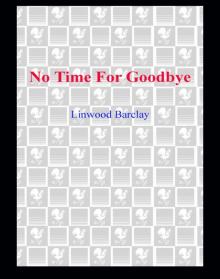 No Time for Goodbye
No Time for Goodbye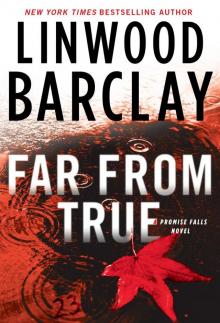 Far From True
Far From True Lone Wolf
Lone Wolf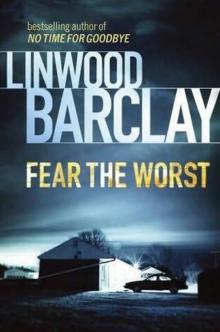 Fear the Worst
Fear the Worst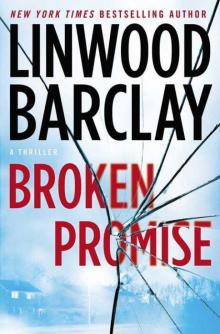 Broken Promise
Broken Promise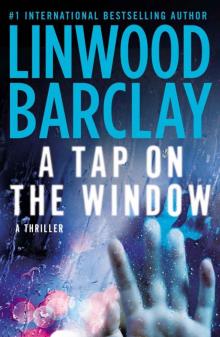 A Tap on the Window
A Tap on the Window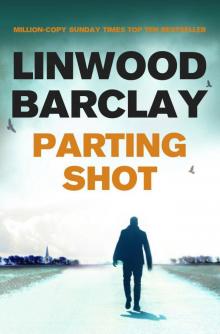 Parting Shot
Parting Shot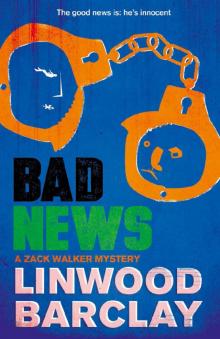 Bad News
Bad News Too Close to Home
Too Close to Home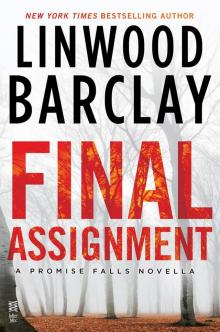 Final Assignment
Final Assignment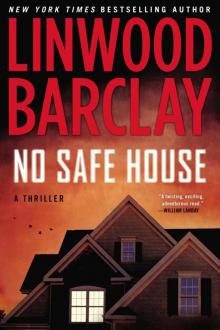 No Safe House
No Safe House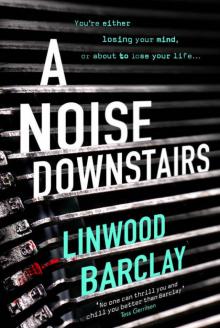 A Noise Downstairs
A Noise Downstairs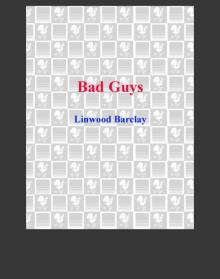 Bad Guys
Bad Guys The Accident
The Accident Stone Rain
Stone Rain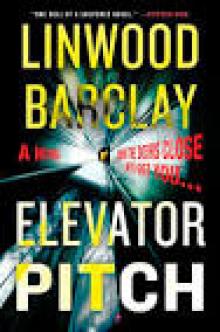 Elevator Pitch
Elevator Pitch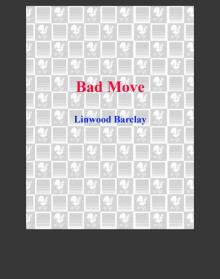 Bad Move
Bad Move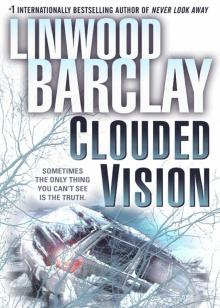 Clouded Vision
Clouded Vision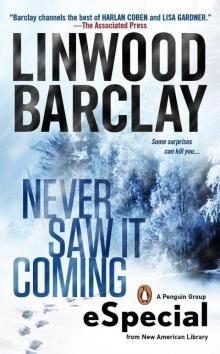 Never Saw It Coming
Never Saw It Coming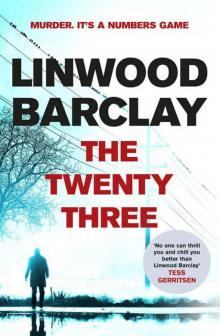 The Twenty-Three
The Twenty-Three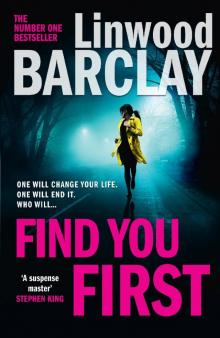 Find You First
Find You First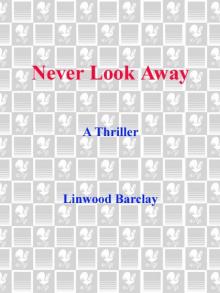 Never Look Away
Never Look Away Elevator Pitch (UK)
Elevator Pitch (UK)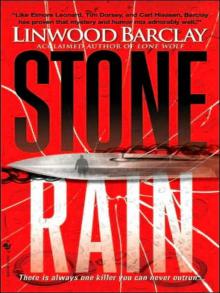 Stone Rain zw-4
Stone Rain zw-4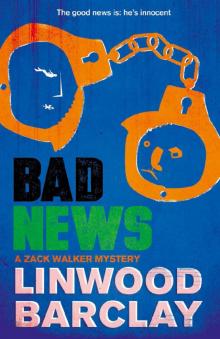 Bad News: A Zack Walker Mystery #4
Bad News: A Zack Walker Mystery #4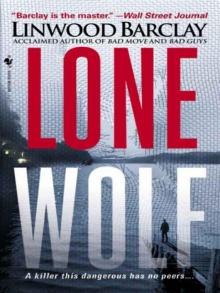 Lone Wolf zw-3
Lone Wolf zw-3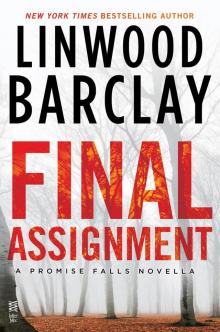 Final Assignment: A Promise Falls Novella
Final Assignment: A Promise Falls Novella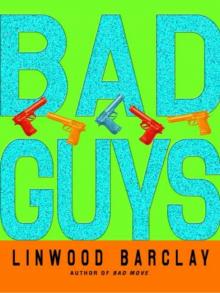 Bad Guys zw-2
Bad Guys zw-2 Never Saw It Coming: (An eSpecial from New American Library)
Never Saw It Coming: (An eSpecial from New American Library)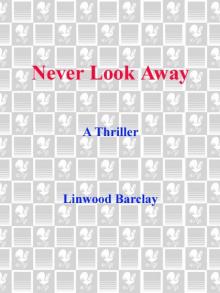 Never Look Away: A Thriller
Never Look Away: A Thriller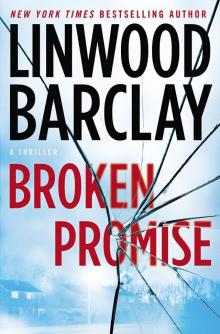 Broken Promise: A Thriller
Broken Promise: A Thriller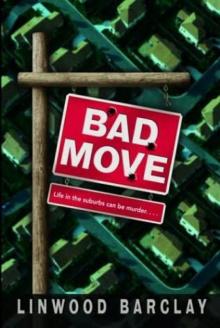 Bad Move zw-1
Bad Move zw-1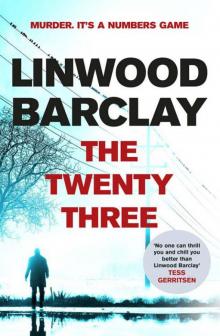 The Twenty-Three 3 (Promise Falls)
The Twenty-Three 3 (Promise Falls)